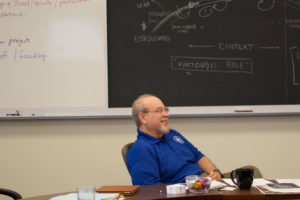Recommended Reading for Deans of Theological Schools
It is not uncommon that those who step up to the office of dean at theological schools enter a realm that is daunting and unfamiliar: academic administration and leadership. More often than not, theological school deans previously enjoyed the relatively pastoral life of scholar and academic. Now, they have to GET THINGS DONE! That means engaging in professional development in a whole new field. Below is a selected list of “starter” books for the dean’s new library. For new deans who wonder how to get a handle on the job, this is a good place to start.
A singular “appreciative inquiry” approach to interpreting theological education today, from the person who knows it best. Insightful, sober, but hopeful.
Banks offers a proposal for changing the way theological education is practiced today. Calls into question current assumptions and models of theological education and harkens to models of ministry formation in biblical times. Banks calls for a “missional model” of education that is more holistic, inclusive, and practical .
An exploration of the perpetual challenge of bridging academy and church, with a focus on the formation of clergy for a “life abundant.” Focuses primarily on practical theology for ministry, and, from that vantage point, raises questions about the purpose of theological education.
Bergquist identifies four traditional, distinct but interrelated “cultures” found in North American higher education: collegial, managerial, developmental, and advocacy. In addition to these traditional cultures two emerging contrasting cultures are treated: the virtual culture and the tangible culture. Implications and corollaries to theological schools are readily evident.
An uneven and sometimes unsatisfying (there is no “theory” to speak of here) treatment by theological school deans on a variety of topics on academic leadership: understanding institutional contexts, nurturing relationships, negotiating conflict, dealing with budgets and limited resources, assessment and accreditation, etc. Enough high spots to make it worth the read, especially by novice deans.
A practical “how-to” of academic leadership. While directed at college deans, very applicable to theological school deans. Covers a wide span of academic, administrative, and supervision leadership issues. Pragmatism is a high value here.
One of the clearest critical treatments on the state of contemporary theological education. A must read for any new leader to theological education, president, dean, or trustee. Cannell’s critique and recommendations for improving the condition, methods, and mission of theological education should be taken seriously.
Strong sociological study of pastoral leadership, congregations, and questions of what sustains excellence and effectiveness. Provides the information and perspective theological schools need to keep close to heart if they are to fulfill their mission of preparing seminarians for the work of ministry.
A seminal critical work on the history, nature, and work of the theological school. It helps answer the question, “How did we get here and why is it so hard to change this institution?” It’s a work all other newer serious treatments on theological education reference.
Explores the influence of the historic traditions and academic settings of major religious traditions in contemporary classroom and communal pedagogies. Based on extensive literary and field research involving surveys, classroom observations, and interviews with faculty, students, and administrators, the book describes varied classroom pedagogies across religious traditions in the “professional education” of clergy.
Revisits the perpetual schizophrenic dilemma of the theological school: an academy or a community of formation? Differentiates the central differences between various forms of theological education: “Athens”, which views education as paideia, the goal of which is character formation and personal transformation, and “Berlin”, which focuses on orderly, disciplined, critical research. A foundational work not for the faint of heart.
A practical book on managing academic change. While written for university department level leaders, the material is very applicable to theological school deans, especially those in smaller schools. Practical ideas on on handling resistance to change, transforming departments (or faculty committees) into productive learning communities, and improving educational quality for students. Contains concrete guidelines for developing structures and policies to shape culture and set priorities.
A very helpful short book that is twice as long as it needs to be. The discerning reader will be able to skip several pages of case study narrative to get to the gems in this short volume. It presents case studies of difficulty real world problems with proven effective functioning of the chief academic leader. A very helpful resource for new deans.
